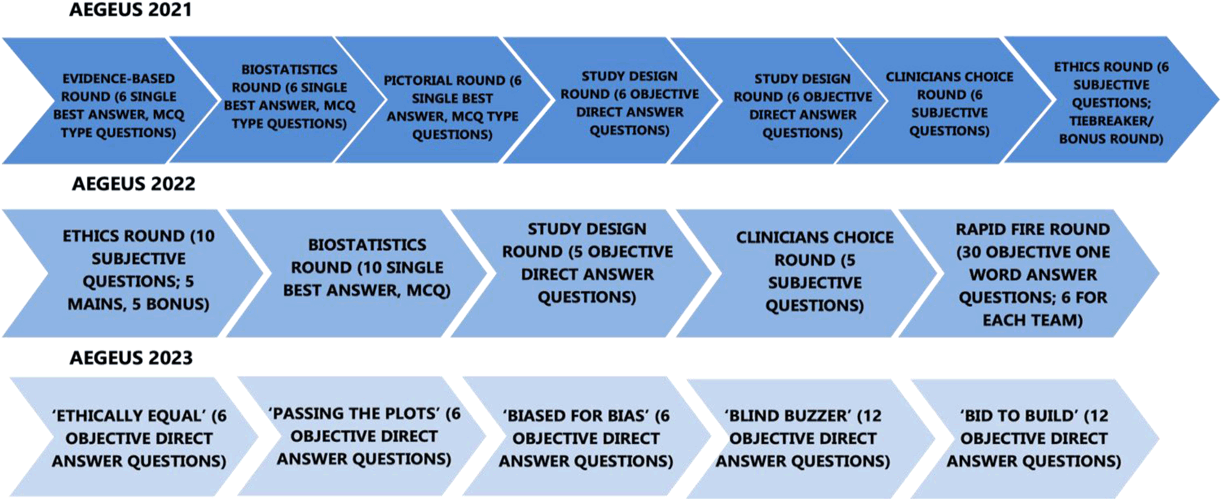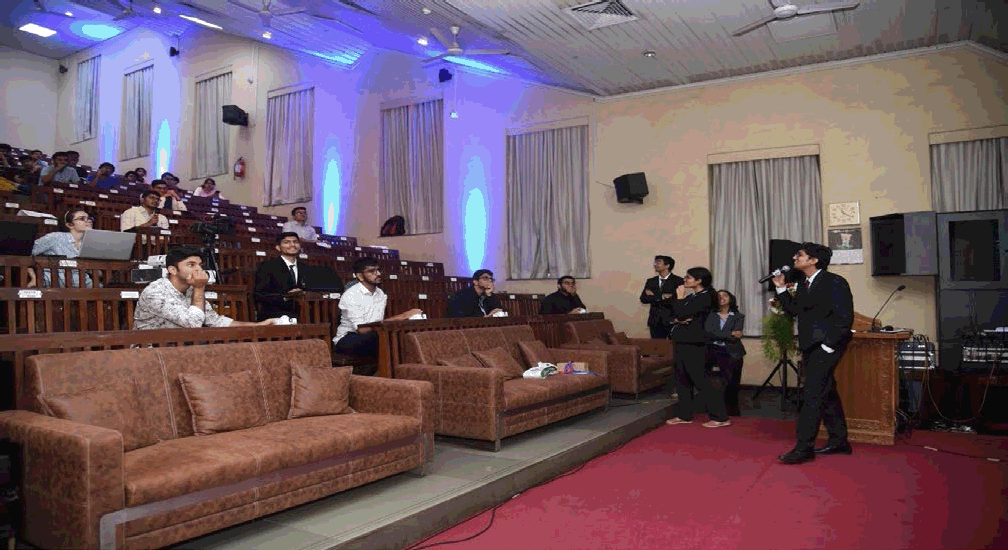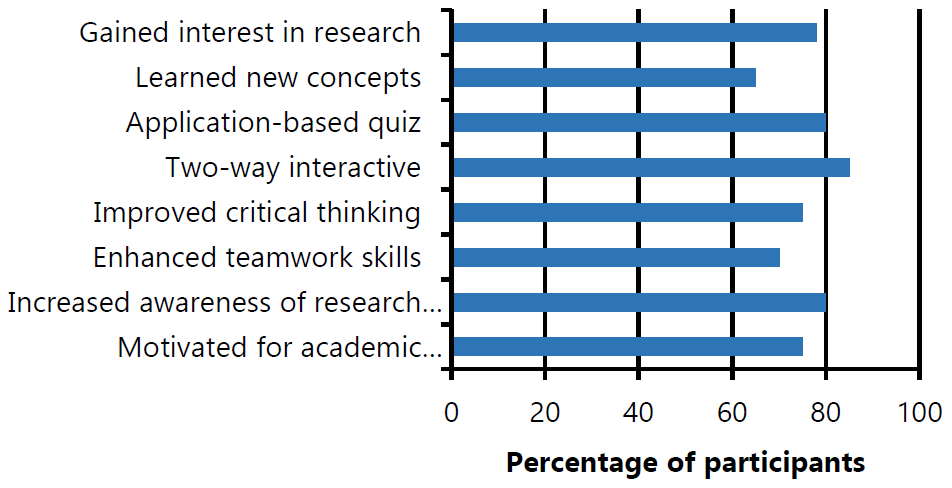The Evolution of Aegeus and its Rounds Over the Years.

Shirish Rao1, Devansh Lalwani2, Amey Ambike1, Yashika Zadage1
doi: http://dx.doi.org/ijms.2024.2656
Volume 12, Number 4: 473-478
Received 16 04 2024; Rev-request 25 08 2024; Rev-recd 27 09 2024; Accepted 23 10 2024
Activities to promote research apart from workshops and conference presentations remain limited among undergraduate students.1 Medical students in India are generally exposed to multiple pre-clinical and clinical quizzes over the course of their undergraduate degrees which encourages them to dive deeper into their core concepts and academics. A healthy competition in the form of intercollegiate quizzes sparks the enthusiasm among students and draws their interest towards the topic.2 Quiz-based learning has shown to encourage student discussions, deepen understanding through peer-assisted learning, and help improve examination techniques by fostering collaborative learning environments.2 Following this idea, a team of undergraduate students embarked on creating the first ever undergraduate research quiz in India. Through this article we share our experience conceptualizing, developing and organizing the national level quiz for 3 consecutive years, 2021, 2022 and 2023.
“Aegeus”- The Research Quiz, was conceptualized in June 2021 who were part of institutions student research council A.S.P.I.R.E as well as the organizing team of the Annual Medical Conference, “Confluence” at Seth G. S. Medical College and K.E.M Hospital, Mumbai, India.3 “Aegeus” was newly added to the conference programme, which already had a rich quizzing culture in the form of pre-clinical and clinicopathological correlation quizzes, which received overwhelming participation across the country. In the year 2021, under the restrictions of COVID-19 pandemic, “Confluence 2021” was organized via online platforms Figure 1. During the subsequent years Confluence was held in-person, which also led to change in format and conduct of “Aegeus”, which was inspired by learning from its previous editions.
Figura 1The Evolution of Aegeus and its Rounds Over the Years.

An organizing team of 6 undergraduate students, from 1st to 5th year of MBBS, were responsible for question making, managing the logistics and hosting the quiz in each edition. Questions for the quiz were created by team members using online resources and standard textbooks and were validated by professors who provided feedback on question framing and correctness. The rounds were based on topics such as ethics, biostatistics, graphs, biases, study design, manuscript writing and other important aspects of applied medical research. The quiz was hosted in two stages i.e. an online elimination round followed by the finals. Undergraduate students from 1st to 5th year were eligible to participate in teams of two. The elimination round consisted of 25-30 multiple-choice questions with a +1/0 marking scheme to be attempted in 30 minutes. Based on these scores, the top 6 teams advanced to the finals. Finals consisted of 5-7 rounds, and each round focused on a particular aspect of medical research. A detailed description of rules and scoring system of each round of every edition is provided in Figure 1 and Table 1.
Table 1.Rounds and Their Rules in Each Edition of “Aegeus” – The Research Quiz.
| R. No. | Round Name | Rules |
|---|---|---|
| Aegeus 2021 | ||
| 1 | Evidence-based Round (6 Single best answer, MCQ type questions) |
|
| 2 | Biostatistics Round (6 Single best answer, MCQ type questions) |
|
| 3 | Pictorial Round (6 Single best answer, MCQ type questions) |
|
| 4 | Study Design Round (6 Objective Direct Answer Questions) |
|
| 5 | Critical Appraisal Round (6 Subjective Questions) |
|
| 6 | Clinicians Choice Round (6 Subjective Questions) |
|
| 7 | Ethics Round (6 Subjective Questions; Tiebreaker/Bonus Round) |
|
| Aegeus 2022 | ||
| 1 | Ethics Round (10 Subjective Questions; 5 mains, 5 bonus) |
|
| 2 | Biostatistics Round (10 Single best answer, MCQ) |
|
| 3 | Study Design Round (5 Objective Direct Answer Questions) |
|
| 4 | Clinicians Choice Round (5 Subjective Questions) |
|
| 5 | Rapid Fire Round (30 Objective One Word Answer Questions; 6 for each team) |
|
| Aegeus 2023 | ||
| 1 | Ethics Round, ‘Ethically Equal' (6 Objective Direct Answer Questions) |
|
| 2 | Biostatics and Graphs Round, ‘Passing the Plots' (6 Objective Direct Answer Questions) |
|
| 3 | Bias Round, ‘Biased for Bias' (6 Objective Direct Answer Questions) |
|
| 4 | Buzzer Round, ‘Blind Buzzer' (12 Objective Direct Answer Questions) |
|
| 5 | Study Design Round, ‘Bid to Build' (12 Objective Direct Answer Questions) |
|
In the year 2023, the format of the quiz was revamped. The feedback received by the past edition's participants indicated the need to add more real-life scenarios, in depth practical knowledge, lesser reliance on subjective scoring by judges and addition of more innovation into each round to make it more exciting.
In order to ensure the same, clinician's choice round was removed, MCQs were replaced by direct answers, each round was given an exciting name which was in line with a twisted rule for each round. Rapid fire round was also replaced by Buzzer Round to allow better scoring and tougher competition. As an objective replacement to the critical appraisal round, a round for identifying Biases in the given research summary was added. To eliminate any discrepancies or need of an expert judge opinion during the final round, process of validation by expert professor was done more stringently and questions were revised to make sure there is only a single best answer and no partially correct answer in any round.
The composition of participating teams was the same as previous editions except that even cross-college teams were allowed to participate. The Top 6 teams faced a total of 5 rounds in the final Figure 1 & Figure 2. Sequence of answering teams was unique in each round based on the rules. In the Ethics round “Ethically Equal”, one question was directed to each team, in the sequence A to F. However, all the other teams had an equal opportunity to attempt the question by answering via ‘chits' during the first 30 sec ‘pounce window'. The sequence for the Biostats round, “Passing the plots”, was from F to A. This round had two sub questions, first was to identify the most appropriate statistical test for the given analysis and second was interpreting a graph made from the related analysis. If the answering team failed to answer the first sub-question correctly the plots were passed to the next team in the sequence. The next round “Biased for Bias” had 6 questions each consisting of the same number of biases as its question number. Scores of the first two rounds were totaled and arranged in descending order. Teams in this given order were given a ‘biased' choice to choose the question number they would wish to attempt. The next round was buzzer with an added twist, “Blind Buzzer”, where one participant from each team was made to sit with the buzzer and the other participant who was sitting away had to answer the question, in case the buzzer was pressed by their teammate. This round consisted of 12 pictorial questions in which the participant had to connect the images and find the common link between them, which was a research term. The last round on study designs had an added twist of ‘Bidding' for each question. A set of 12 questions were displayed one at a time, which were open to receive a bid from all the team. Teams had to bid from their own points which they had earned during all the previous rounds. One audience question was also kept at the end of each round. The top 2 teams were awarded with cash prizes, medals and gift hampers.
Figure 2Photograph From In-Person Aegeus 2023.

Total of 39 teams registered in 2021, 38 in 2022 and 48 in 2023, summing up to 250 participants over the course of 3 years. Top 2 teams in each edition were awarded with cash prizes, medals and gift hampers. In 2023, an online post-event feedback form was shared with the participants and the conference delegates after the quiz. The conference delegates who were not active participants of the quiz (n=320), suggested that 73% gained interest in learning and conducting research and 66% reported that they learned new research concepts while attending the quiz Figure 3. Quantitative Feedback from the participants is provided in Table 2. To improve the participation of undergraduates in research, such competitive incentive-based quizzes represent a novel approach. It is necessary to take constructive feedback from each edition in order to improve on the next. Addition of new twists to the rounds and the scoring system also makes the quiz more exciting, gripping, competitive and most importantly enjoyable for both participants and the audience. However, registration for such events was lower compared to traditional academic quizzes, indicating the need to raise awareness. With many undergraduates now involved in research projects, it is hoped that this quiz format will serve as a foundation for future development. There is a need for scaling up such events so that the participation expands more students nationally and internationally.
Figure 3Feedback from Conference Delegates (Non-Quiz Participants)

Qualitative Feedback from Participants
| Feedback 1: Third-Year MBBS Student |
| “Participating in the finals of 'Aegeus - Research Quiz' was an enlightening experience. The event was not just a quiz; it was a journey through the intricacies of medical research, presented in an extremely innovative and professional manner. Kudos to the Aegeus team for organizing such a brilliant event. I'm eagerly looking forward to the next edition and encourage all my peers to experience this unique blend of learning and competition. Their hard work truly deserves all the appreciation!” |
| Feedback 2: First-Year MBBS Student |
| “I had the privilege of being part of 'Aegeus - Research Quiz' yesterday, and I must say, it was one of the most professionally executed events I've attended. The quiz format was remarkably innovative, fostering a deep engagement with research concepts in a competitive yet fun environment. A big thank you to the Aegeus team for such an incredible learning opportunity. I highly recommend it to everyone here and can't wait for the next one!” |
| Feedback 3: Fourth-Year MBBS Student |
| “Yesterday's participation in the 'Aegeus - Research Quiz' was truly a game-changer for me. The entire event was flawlessly organized, with a focus on applied knowledge and practical research skills. It was refreshing to see such enthusiasm and professionalism from the Aegeus team. This event is a must-attend for those looking to deepen their understanding of medical research. Great job by the team, and thank you for such an inspiring experience!” |
| Feedback 4: Second-Year MBBS Student |
| “The 'Aegeus - Research Quiz' was an exceptional event that stood out for its innovative approach to learning. Participating in the finals offered me a unique insight into the application of research in medicine, something textbooks alone cannot provide. The effort and dedication of the Aegeus team in organizing such an event are commendable. I'm already looking forward to participating in the next edition and encourage others to do the same. Such initiatives truly enrich our academic journey.” |
Undergraduate students often have limited avenues to engage in research beyond workshops and conferences. In India, medical students face numerous pre-clinical and clinical quizzes, fostering a deep understanding of core concepts. Intercollegiate quizzes further stimulate their enthusiasm and focus on specific topics. Building on this, undergraduate students from A.S.P.I.R.E, the research council of Seth GS Medical College and KEM Hospital, Mumbai, launched “Aegeus,” India's first undergraduate research quiz, in June 2021.Hosted annually under the “Confluence” undergraduate medical conference since 2021, “Aegeus” has grown in participation and evolved in format over three years. Students collaborated on question creation, logistics, and hosting, while professors validated the questions. The quiz covers diverse topics like ethics, biostatistics, study design, and manuscript writing, promoting practical application of research concepts. Each edition has refined the format to boost engagement and competitiveness. Feedback indicates “Aegeus” has positively impacted students' interest and understanding of research concepts. Despite its success, raising awareness to boost future participation remains a priority.
None.
The Authors have no funding, financial relationships or conflicts of interest to disclose.
[Using the authors's contribution table fill the information here with the initials of the authors after each activity].
1. Ghosh K, Ghosh K. Medical Research In Medical College In India: Current Scenario And Ways To Improve It. J Assoc Physicians India. 2019 Apr;67(4):71–3.
2. Dengri C, Gill A, Chopra J, Dengri C, Koritala T, Khedr A, et al. A Review Of The Quiz, As A New Dimension In Medical Education. Cureus. 2021 Oct 18
3. Mulkalwar A, Krishnani O, Rao S, Tripathi R. A.S.P.I.R.E: A Student Led Initiative To Foster A Facilitative Environment For Undergraduate Medical Research. Perspectives in Clinical Research. 2022 Jun;13(2):65.
Shirish Rao, 1 MBBS Intern, Seth GS Medical College and KEM Hospital, Mumbai, India
Devansh Lalwani, 2 MBBS Student, Seth GS Medical College and KEM Hospital, Mumbai, India
Amey Ambike, 1 MBBS Intern, Seth GS Medical College and KEM Hospital, Mumbai, India
Yashika Zadage, 1 MBBS Intern, Seth GS Medical College and KEM Hospital, Mumbai, India
About the Author: Shirish Rao is a dedicated medical professional with a strong background in research and public health. He completed his MBBS at Seth GS Medical College and KEM Hospital, Mumbai. His works with organizations such as ASPIRE, ASAR and the G4 Alliance on projects related to medical education, surgical care, pain medicine, mental health, health systems and policy. He has won several awards including ‘Dr. Urmila Thatte Award for an Undergraduate Student for Outstanding work in the field of Medical Research and Innovation' and also contributed to multiple international studies and presentations. He is passionate about improving surgical care and public health through policy-based research and grassroots advocacy.
Correspondence: Shirish Rao. Address: Seth GS Medical College and KEM Hospital, Mumbai, India. Email: shirishrao.1608@gmail.com
Editor: Francisco J. Bonilla-Escobar; Student Editors: Muhammad Tayyab Ijaz, Marsha Zacharia & Sayan Sarkar; Proofreader: Amy Phelan; Layout Editor: Julian A. Zapata-Rios; Process: Peer-reviewed
Cite as Rao S, Lalwani D, Ambike A, Zadage Y. Impact of “Aegeus” - A Novel Research-Based Quiz for and by the Medical Undergraduate Students in India. Int J Med Stud. 2024 Oct-Dec;12(4):473-478.
Copyright © 2024 Shirish Rao, Devansh Lalwani, Amey Ambike, Yashika Zadage
This work is licensed under a Creative Commons Attribution 4.0 International License.
International Journal of Medical Students, VOLUME 12, NUMBER 4, December 2024